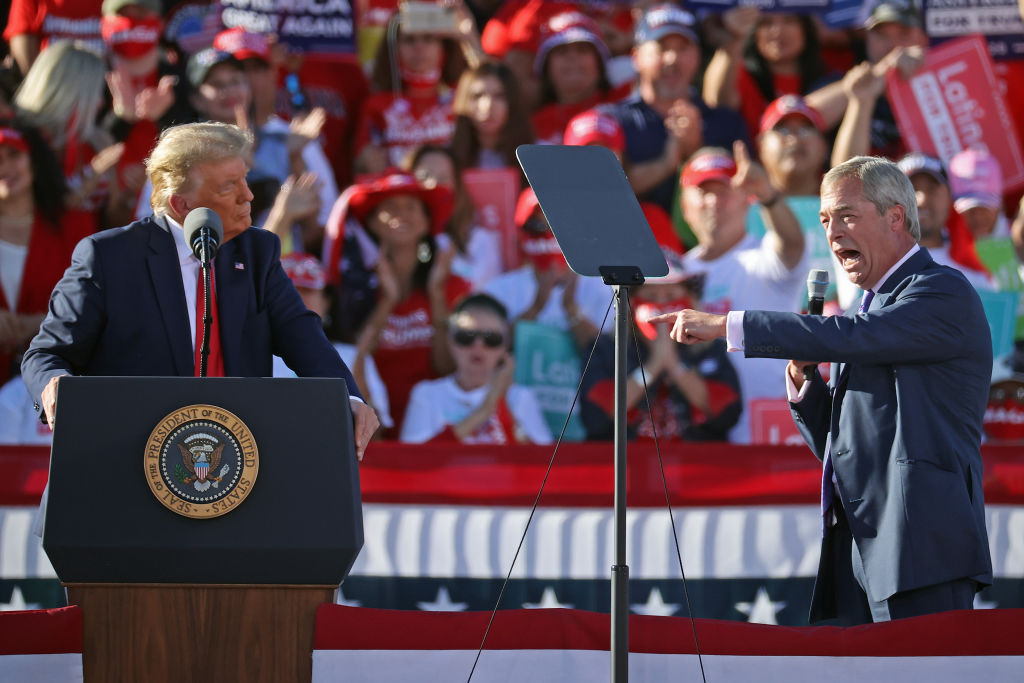Recent days have seen the British Labour Government on the receiving end of much mockery about Donald Trump’s sweeping victory in the US presidential election. The party’s leading lights have been subjected to an exercise in offence archaeology so thorough as to make the dig for King Tut’s tomb seem a minor undertaking in comparison.
Pundits have correctly noted how Nigel Farage has far better relations with the entire Trump operation than any Government minister. Yet whether or not Keir Starmer takes up the Reform UK leader’s offer to act as a “bridge” between his administration and Trump’s incoming one, who can doubt that effective working relationships will ultimately be established? That’s just what happens with UK and US governments, even with one as unorthodox as Trump’s.
What has been missed is another looming party-political battle for the ear of this new Right-wing American regime: the one between Farage’s Reform and the Conservative Party. While new Leader of the Opposition Kemi Badenoch congratulated Trump in the Commons on Wednesday and enjoyed making Foreign Secretary David Lammy squirm about his previous statements, the Tories clearly aren’t in a good place on this score.
During the Conservative leadership contest, Robert Jenrick was widely criticised by colleagues for saying that he would vote for Trump were he a US citizen, while Badenoch’s reply when asked if she preferred Trump or Kamala Harris was: “I like them both equally.” This was widely interpreted as meaning she disliked them both equally.
Aside from Liz Truss, the weight of commentary from the Tory grandee class was firmly against Trump and for Harris. The super-connected Michael Gove backed Harris as “the lesser of two evils”, while former party leader William Hague described Trump as “a nasty individual” who “must lose” during a radio rant on polling day itself.
This Tory establishment mindset will be recognised by Trump and his key allies as being identical to the snooty hostility exhibited towards him by the US Republican Party establishment before he cleared them out. And Trump himself is surely likely to view his friend Farage as his British equivalent in terms of seeking to reorganise the Right around a national-conservative programme and away from the high liberalism of global free trade and open borders.
Naturally, the Starmer regime will regard Farage’s offer to be a link man to Trump “in the national interest” with suspicion, thinking it far more likely that the Reform leader is seeking to further his own interest and underline his standing with Britain’s most important ally. And yet, needs must.
The requirement to forge effective working relationships quickly is immense. The fate of Ukraine, the US commitment to Nato and the prospect of Trump imposing trade tariffs are all first-order concerns. Securing continued full intelligence-sharing is also a vital British interest, and the Foreign Office will want to bind the Trump administration into continuity of policy towards Israel. Is it worth giving Farage a status uplift in return for beating a similarly disconnected EU to the American top table? There must be a strong case for that.
And there is a potential silver lining to being seen to use Farage as a conduit. Imagine a Trump visit to the UK next year in which both Starmer and Farage were seen to have plenty of time with the President, but the Tories were left out in the cold beyond minimal courtesies.
By appointing Priti Patel as Shadow Foreign Secretary, Badenoch has put in place someone who has not spoken ill of Trump and is far more compatible with his style and policy agenda than her more patrician predecessor Andrew Mitchell would have been. That’s before getting to the last Tory foreign secretary, David Cameron.
But, in general, the current Conservative hierarchy has far better contacts with the disappearing Mitt Romney end of the Republican Party than it does with those riding on the Trump train. It has long been obvious to astute observers of British politics that the “One Nation” strand of Toryism no longer has a substantial constituency of domestic electoral support. That it has also become kryptonite in terms of foreign and diplomatic policy will be another well-deserved blow to its still exaggerated sense of self-esteem.











Join the discussion
Join like minded readers that support our journalism by becoming a paid subscriber
To join the discussion in the comments, become a paid subscriber.
Join like minded readers that support our journalism, read unlimited articles and enjoy other subscriber-only benefits.
Subscribe